Gene-Editing Therapies for Parkinson’s Disease
Download our Technology Catalog
Overview
Parkinson’s disease is associated with the accumulation of alpha-synuclein aggregates in dopaminergic neurons of the substantia nigra pars compacta, leading to cell death and resulting loss of motor control.
Our scientists developed a method for treating Parkinson’s disease by editing the gene that encodes alpha-synuclein to prevent aggregation of the encoded protein in affected cells.
Gene-Editing Therapies for Parkinson’s Disease is protected by U.S. Patent Number 10,752,919 (with additional patents pending in the U.S. and in other countries). Of note, certain claims of the granted patent are not limited by type of nucleic acid or formulation.
Example Applications
- Employ multiple therapeutic strategies – monoallelic or biallelic inactivation of alpha-synuclein in vulnerable cells, altering alpha-synuclein mRNA splicing to generate non-aggregating forms by ablating splice acceptor/donor sites, etc.
- Combine with Factor’s Chromatin Context-Sensitive Gene-Editing Endonuclease for high-specificity in vivo gene editing
- Combine with Factor’s ToRNAdo™ Nucleic-Acid Delivery System for high efficiency in vivo delivery – proven delivery to brain in vivo